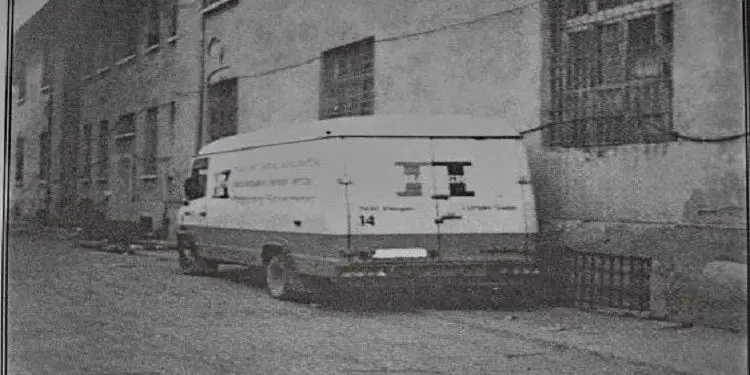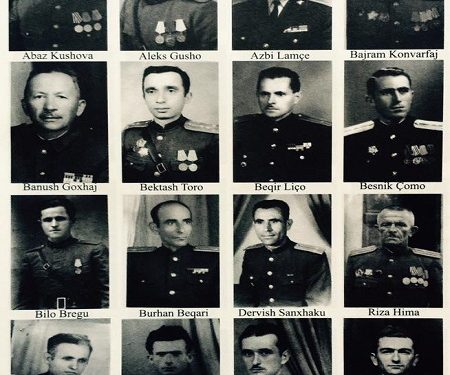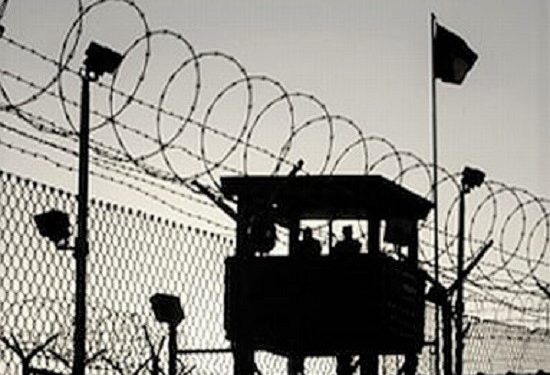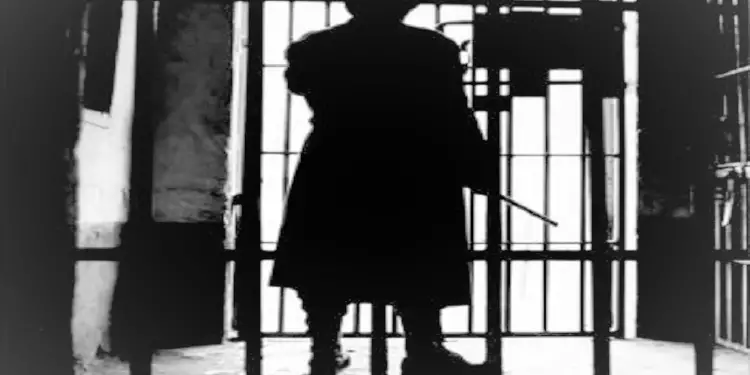By Afrim Imaj
Memorie.al / In the prison cells of communism, women were often turned into victims of sexual violence by the officials who kept them in custody, but not only. The perverse show, recently brought to the attention of the public with the shocking testimony of Alida Hisku, the well-known singer who dared to publicly denounce it, has sparked numerous debates, pitting those who accept the existence of the phenomenon against each other and others who they don’t believe it. Surprisingly, in the group of the latter, in addition to the scoundrels of the infamous regime, some ex-persecuted who suffered a lot in the hell of the communist prisons, who guarantees that in no case, the stupidity of the dictatorship has reached to rape. The truth that comes from the archives leaves no room for dilemmas about the existence of the monstrous phenomenon.
In the most recent book, “Communism Camps and Prisons”, historian Kastriot Dervishi, former director of the Archives of the Ministry of the Interior, brings a multitude of facts that prove the bastard behavior of the people of the regime with the women and girls who populated the places of punishment. In an interview for the newspaper “Panorama”, he recounts, using the language of documents, the endless cases when women were victims of sexual violence by investigators, guards, prosecutors, judges, and even the leaders of inhumane camps.
Surprised by the discussions for and against the existence of the phenomenon, Dervishi opposes the part that excludes the act of sexual violence, among other things, with a report of the US government from 1955, where cases of rape are denounced with concrete examples. , even from the leaders of the camps and prisons of the regime…!
Mr. Kastriot, in your most recent book, “Communism Camps and Prisons”, occupies a special place, the mistreatment of women, including rape. Has the phenomenon been massive, or is it a matter of sporadic events?
The rape of women or their mistreatment in the communist regime, has its origins already in the war years, as an expression of hatred towards the “enemy”. With the great upheaval, at the end of 1944, Albania experienced extraordinary social developments. The relationship between educated intellectuals and the uneducated element was reversed.
Most of the elite faced the terrible inquisition, mass murder and imprisonment. At the head of the country, in important positions, even ordinary elements, murderers, thieves or criminals landed. They alienated the entirety of social relations, but not only. The attitude of the communists, newly in power, especially with the “reactionary” part, has been typical of the behavior of a gang. Women, due to their fragile nature, were the first victims of this bandit behavior.
Beyond this context, how has the phenomenon of rape of vulnerable women in the prisons and camps of the regime appeared?
If we made a categorization of cases about the rape of women, always according to the documents, the order would be this: –
-Rape of internees in camps with barbed wire.
– The rapes of prisoners’ wives, who came to meet their husbands. (Cases in Maliqi Camp, Burrel Prison, Spachi, etc.)
-Rape during the investigation process.
-Rape while serving the sentence in the prisons of the prefectures (women’s rooms), the crafts of Tirana, in wards 318 in the city “Stalin”, in Kosova of Elbasan, etc.
-Rape of women of prisoners or defendants.
-Rape against foreign women, such as German, Italian and Greek.
Who was involved in these monstrous stories?
In general, Security operatives, prison internal service police, prison and camp managers, investigators, etc.
So, in the barbed wire camps, this phenomenon has been massive…?!
They were the first isolated places where rapes were committed against young women and girls. Initially, they were opened in 1945 and operated until 1953. In them, the relatives of the following categories were sentenced: Family members of fugitives, political prisoners sentenced to death or prison, partisan defectors, etc.
It was for this reason that in barbed wire camps, there were mostly young children, teenagers and women.
It was with this vulnerable group that the regime showed its bravery every day. Especially in the camps of Valias, Cërrik and that of Tepelena, the rape of women by their personnel has been a massive phenomenon. The US government has also drawn attention to this.
Based on the testimonies gathered from the few Albanians who escaped from Albania, in February 1955, she submitted a report to the UN, in which she refers, as follows, to concrete cases of officials abusing women unprotected. “Abedin Zeqiri, who was a resident of the concentration camp, before he escaped to Yugoslavia, in 1952, announced that Xhafer P., the director of this camp, hardly caught one of the most beautiful women who lived there every day. The policemen who served in the camp abused every beautiful girl in the camp.”
You can find such facts in abundance in the official documentation of the Ministry of the Interior. “The operational worker of the camp, named Mantho, is underlined in the report dated 7.6.1952, tortured, robbed and stole the convicted ‘monarcho-fascists’, while in another case, he attempted to rape a woman. This during the stay in camp no. 5, in Plow of Lushnja”.
One such guy was “Lieutenant Baba”, whose exploits are still heard, especially in the Northern areas…?!
This is the story of Hodo Habil, also known as “Lieutenant Baba”. Beyond the murders or tortures, for which he stood out among the bandits of the Security, he stood out among them for his barbaric behavior towards women.
He accepted this with his own mouth, but he was also denounced by tens and hundreds of citizens. In one of his testimonies, “Lieutenant Baba”, states in the first person: “Before committing the murders, I arrested a girl in Fishtë village. After I arrested him, I told the partisans to tighten him. They tortured him. I then called him into a room and forced two women to strip him naked. They couldn’t undress her, because the girl didn’t want to and was crying.
Then I forced her to undress and the girl undressed as her mother did. I left her naked for more than half an hour and then I let her get dressed. The girl was seen naked by some soldiers and some of the people…! I stripped a woman in Dedaj village of Koplik and put her in the snow.”
In the list of raped women, at least, as far as they were proven during the judicial process, there are also two nuns. The testimony of one of the rape victims is chilling. Here’s what she says, among other things: “Lieutenant Baba came to my cousin’s house… He tied up his cousin and took them all out. He came from the side of my house and after locking everyone in a room, he asked me where my brothers were. When I told him outside, he told me to secure the door.
I told him that the door was secured, but he told me to get up and secure it, as we were going to make love. He told me that he didn’t eat this thing and he didn’t want my brothers to come and catch him. For this he took an iron to put on the door. He came to me with a machine gun in his hand and said: ‘I’m going to pour on you today, I’m pouring on your Christ’ and he started doing what he did to me that I can’t say.”
In the book, you say that even in forced labor camps, there were cases of rape…?!
Typical cases were those against women who came to visit their relatives or husbands in the Maliqi camp. This is also accepted in the documents. In the report dated 23.8.1950, of the Camps and Prisons branch in the Police Directorate, in the Ministry of Internal Affairs, among other things, it was said: “In the Maliqi camp, some branches have sent police officers with poor morale , which as a consequence, have also committed some immoral acts, capturing wives of prisoners with rape; as well as some of them go to Korça and brutalize immoral girls with violence”.
In another report, dated 13.1.1951, of the Department of Camps and Prisons, it is underlined: “The disciplinary situation of the collective has been good, with the exception of cases… (we are talking about service issues – note) and some cases of immorality. Out of the 4 policemen prosecuted, 3 are for immorality, for capturing a wife of a prisoner in Orman – Pojan, who was forcibly dishonored”.
Were there similar cases in other prisons?
In each of them, the leaders and guards had the same behavior with the women prisoners or their men.
To make the phenomenon clearer, I am giving two cases that refer to the documents of the time. – Lieutenant Ismail M. was only 26 years old in 1945, when he was appointed commander of prison no. 13 of Elbasan. This one, taking advantage of the fact that a girl had a brother in prison, asks her to have sex, because otherwise, her brother would face consequences.
Also, the same prison commander had raped two female prisoners of the prison of Elbasan – E.K., the wife of the political prisoner, Jani K., imprisoned in the prison of Burrell, declared in the office of the Prosecutor General that the director of the prison of Burrell, along with two other women, had waited for them in the office, started making fun of them, rubbed their hands and asked to kiss them.
The women were asked to enter a room one by one. On 3.12.1948, the women filed a criminal report against the director of the Burrel prison, Vangjel Rrêmbeci, who, in addition to stealing the packages sent by their family members, provoked them to enter into intimate relationships.
And yet, the prosecutor’s office closed the investigations, because: “it had not found evidence”. A serious incident reported in 1951, forced the communist regime to take measures, for a gang operating within the Police. Members of this troupe appeared in Tirana just like a gang of rapists.
On 8.3.1951, the Supreme Military Court sentenced 6 of them. At the center of the group was the 34-year-old lieutenant M. M., a butcher by profession, who had become effective “for special merits”. The others were farmers, miners and bakers by profession.
They were accused of “violation of duty, arbitrary residential violence and violation of the uniform and authority of the Police”.
In the justification of the decision, it was said, among other things, that they: “being in the Police force, with different command positions, have committed a series of vile and hostile acts, violating their duty, using their office, to cheated and violated different women, have illegally controlled families and created the ground for their subordinates to fall into such crimes, especially by using immoral women.
All the orientation of these defendants has been used towards amusements and vile immoral acts…! In particular, the defendant lieutenant M. M., arbitrarily, tries to forcefully dishonor Lumturi Sh., whom he forcibly takes to his house, which he had made a cradle of corruption.
At the same time, together with his subordinates I.D., R.D., A.D. etc., deceive Suzana G. allegedly to help her find the house of two friends and lead her out of Tirana, where they take advantage of the fifth.
While the defendant lieutenant N.K. tries to constantly dishonor the named Margarita Sh., against her will, by often violating her house…
The defendant F.P. reaches such a degeneracy that he uses a number of women and uses his office, calling various women to the office, such as Lumturi Sh., whom he tries to dishonor in the office. At the same time, when the women of the people come to ask for their rights, instead of performing the duty, he takes advantage of the opportunity and proposes to use them, in case the request is fulfilled.
The defendant, lieutenant J.B., violates the assigned duty not to allow cases of immorality in the flower garden of the Cultural Link with the Soviet Union and becomes an example himself, making gestures of immorality, with immoral women, such as Zenepe K., etc.
Foreign women also had such a fate, you underline in the book. Do you have a special story?
I was impressed by the story of the Polish woman named Barbara. At the age of 18, in 1960, she came to Durrës together with her husband, with whom she had studied in Poland. In 1964, he was put under the pressure of the Durrës Internal Branch, whose leader raped him.
In 1966, she informed the Polish Embassy about what had happened to her. In 1969, he was arrested and sentenced to 17 years in prison. After suffering 3 years and four months in Kuçovo, he goes to Durrës. The first husband had abandoned her.
Under these conditions, he accepts a second marriage, while he works three shifts in the Durrës Plastics. In 1973, she wrote a letter to Enver Hoxha about her life. In the summary report regarding this letter, it is stated: “He claims that in October 1964, the head of the Department of Internal Affairs, K.N., took him with “Gaz” and together they went to a villa on the beach of Durrës, where they would come for meeting, with a representative from the Ministry of the Interior.
He said that upon entering the villa, where there was no one, K.N., locked the door, placed the pistol on the table and half-naked tried to subdue her, but she defended herself. He was warned by him not to tell anyone about this event.”
But also, in this story, the name of Feçor Shehu is also included, whom another cadre accused of his work style, his immorality, as well as of a rape he had committed against Barbara. For this framework, Feçori “was a feminist, because she dyed her hair like women, etc.”. Memorie.al














